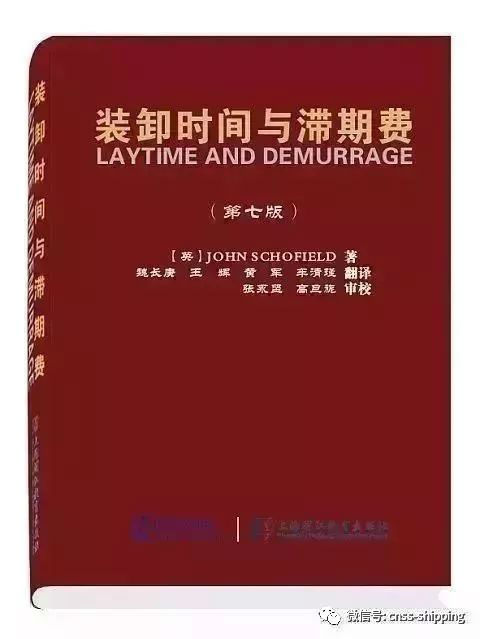《装卸时间与滞期费》第6版
CHAPTER 3 第3章
Commencement of laytime 装卸时间的起算
CHAPTER 3 第3章
Commencement of laytime
装卸时间的起算
3.5 Where such a formula is used, the effect is as if the berths, docks or ports, as the case may be, which are subsequently nominated by the charterer, were written into the original fixture. The ship therefore reaches her specified destination, not when she reaches the geographical area named in the charter, but when she reaches the first berth, dock or port named by the charterer and the charter is accordingly a berth, dock or port charter.
3.6 The option that is thus given is one given by the shipowner for the benefit of the charterer and is a true option. In Tharsis Sulphur & Copper Co Ltd v Morel Brothers & Co and others, a vessel was chartered to proceed to the Mersey anddeliver her cargo at any safe berth as ordered on arrival in the dock at Garston.On arrival, a berth was ordered by the harbour-master as customary but there wasa delay in unloading due to the crowded state of the dock, which prevented thevessel being berthed for some time, and the shipowners claimed demurrage. Theprincipal point at issue was when the vessel became an Arrived ship and on thisthe Court of Appeal held that the charter was a berth charter so that time did notbegin to run until the vessel berthed. In the course of his judgment, however,Bowen LJ dealt with the exercise of an option by a charterer to nominate a berth,dock or port saying:
7Then we were told that an option was given to the charterer, and that it was notproperly exercised unless a berth was chosen that was empty. But I think there was aconfusion in this argument also. The option is given for the benefit of the person who3 See post at paras
3.35 (berth charters);
3.43 (dock charters);
3.52 (port charters).4 See post at paras
3.374 et seq .5 In The Laura Prima [1980] 1 Lloyd’s Rep 466 in the High Court, however, Mocatta J held atp. 468 that in an Exxonvoy 69 or Asbatankvoy form of charter, even where the loading port wasdeclared as “one safe berth . . . ”, the charter remained a port charter.6 Tharsis Sulphur & Copper Co Ltd v Morel Brothers & Co and others [1891] 2 QB 647.7 Ibid ., at p. 652.COMMENCEMENT OF LAYTIME85was to exercise it. He is bound to exercise it in a reasonable time, but is not boundin exercising it to consider the benefit or otherwise of the other party. The option isto choose a port or berth or dock, that is one that is reasonably fit for the purpose ofdelivery. It will not do, for instance, to choose a dock the entrance to which is blocked –that would be practically no exercise at all of the option. . . . To limit the option ofthe charterer by saying that, in the choice of a berth, he is to consider the convenienceof the shipowner, is to deprive him of the benefit of his option. The most that can besaid is that the charterer does not exercise his option at all unless he chooses a berththat is free or is likely to be so in a reasonable time.
3.7 In the absence of a reachable on arrival provision, 8 the shipowner has noright to complain if he cannot get into the nominated berth or dock, or indeedport on arrival (nor in the absence of an always accessible provision can he complainabout an inability to get into or leave such a berth, dock or port) becauseof some temporary obstruction, whether natural or man induced, such as lack ofwater or congestion. Still less can he complain if the port is named in the charter.Dicta in the Reardon Smith case suggest that the only limitation to the charterers’right to nominate is where the delay caused by the “temporary” obstruction wouldbe so unreasonable as to frustrate the commercial adventure. 9 Although largelybeyond the scope of this book, where the obstruction is more lasting in nature,there are cases relating to whether the courts will imply a warranty of safety andthus an obligation not to nominate a port that is impossible to access. In commentsthat were obiter dicta , Thomas J said in The Aegean Sea : 10I would accept that in the case of a voyage charterparty there must be an impliedwarranty that any port nominated must be one that it is possible for a vessel to reach. . . But beyond that, it is an open question whether any term should be implied intoa voyage charter where there is a range of unnamed ports and where there is no expresswarranty of safety . . .However, in The Epaphus , 11 a commodity sale and purchase case, Staughton Jin the High Court and a majority of the Court of Appeal, led by Sir John DonaldsonMR, held that the nomination of a port that the vessel was too deep toenter was a good one. In that case a named ship (although the position wouldapparently have been the same under that contract if it had been unnamed) wasto discharge at “one main Italian port” nominated by the buyers of the cargo. Theynominated Ravenna, which the ship was unable to enter. There was no requirementthat the port nominated be a safe one. In the Court of Appeal, Sir John Donaldsondistinguished the Reardon Smith case 12 and a case he called the Olivebank case, 13where charterers had nominated a Danish port that the ship concerned was unable8 See post at para.
3.470.9 Reardon Smith Line Ltd v Ministry of Agriculture, Fisheries and Food [1959] 2 Lloyd’s Rep 229, atp. 248.10 Aegean Sea Traders Corporation v Repsol Petroleo SA and another (The Aegean Sea) [1998] 2 Lloyd’sRep 39.11 Eurico SpA v Philipp Brothers (The Epaphus) [1986] 2 Lloyd’s Rep 387; [1987] 2 Lloyd’s Rep 215.12 Reardon Smith Line Ltd v Ministry of Agriculture, Fisheries and Food [1961] 1 Lloyd’s Rep 385.13 Aktieselskabet Olivebank v Dansk Svovlsyre Fabrik Ltd [1919] 2 KB 162.COMMENCEMENT OF LAYTIME86to enter owing to a prohibition by the British Government applied during the FirstWorld War, saying: 14Any implication that orders could never be given to go to Vancouver (in the VancouverStrikes case) or to Aalborg (in the Olivebank case) would have contradicted the expressterms of the contract. But it would be quite otherwise if the term to be implied wasthat the vessel could be ordered to Vancouver/Aalborg, unless that port should havebecome impossible subsequently to the making of the contract.
3.8 He continued that in the cases he had mentioned, the “impossibility” aroseafter the date of the contract, and he concluded that it would have been quitedifferent in the instant case, where a sudden storm had silted the harbour at Ravenna and reduced the maximum permissible draught.
3.9 In the High Court, Staughton J took a view apparently largely shared bythe majority in the Court of Appeal: 15In my judgment, if a shipowner contracts to go to one out of a number of namedports, such as the charterer shall nominate, and does not qualify that choice with theword “safe”, there is a good deal to be said for the view that he takes upon himselfthe task of ascertaining that his ship is of a size that can enter all those ports.
3.10 In the Court of Appeal, Sir John Donaldson did however admit 16 that, hadthe contract provided for delivery “at one Italian port” rather than “at one mainItalian port”, there would have been scope for considering whether the partiesintended to restrict the choice to one suited to the vessel, which he said wouldhave involved no contradiction of the express terms, only their construction.
3.11 It would therefore seem that the more restrictive or qualified the range ofports, the less the courts are likely to interfere with the nomination made by theparty having the choice. The distinction between a dock that is blocked on morethan a transient basis and a port that is too shallow to enter seems somewhat fine,unless of course one is due to a supervening event, as suggested by Sir John Donaldson.It therefore seems likely that this subject will again come before the courtsbefore very long.
3.12 Once the charterer has made his nomination without reservation, then inthe absence of a provision to the contrary in the charter, he has no right to changethe nomination, 17 unless for some reason the original nomination can be shownto be invalid. 18

新闻投稿、爆料、信息发布请联系
E-mail:news@xtshipping.net
免责声明:本文来自互联网自媒体,不代表海运管家的观点和立场。



